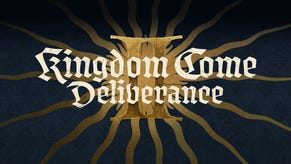Baldur's Gate 3 isn't just Divinity: Original Sin in a Dungeons & Dragons skin
Baldur's Gate 3 begins with a group of survivors piecing themselves together after a shipwreck. There's some recruitment and chatter, a few things to learn about your impending quest, and a handful of folks to recruit. It's very similar to the opening of Divinity: Original Sin 2 following your shipwreck on the beach outside Fort Joy.
It would be easy to assume that with the praise rightly heaped on Larian Studios' two excellent Divinity: Original Sin games, the team could just reskin what's been before in the rich coat of Dungeons & Dragons and its Forgotten Realms. The first tease early last year of Baldur's Gate 3 was light on details, but after watching nearly three hours of gameplay and sitting down with the ever-passionate team at Larian, it's clear this is truly D&D: The Video Game, combined with the natural evolution of Larian's excellent RPG craft. Not just D&D in its looks and recreation of Baldur's Gate and the Forgotten Realms, but also in its adherence to a rigid ruleset. And beyond the ruleset, it's D&D in the sense it requires constant improvisation. Your battles will go south. Your tactics will need to be updated on the fly. You need to adapt or die. You may be able to influence the die roll a little, but you should never rely on it.
Now that we have gameplay footage to pore over of the first section of Baldur's Gate 3, it leaves us with multiple questions. We took the opportunity to talk with senior writer Adam Smith about the comparisons between the two games, implementing Fifth Edition D&D rules into a video game, making failure fun, how to interact with companions, multiplayer and more.
"The way we built it has been ground-up D&D"
VG247: So what are you going to say to people that see it and go, ‘This is Divinity: Original Sin but with a D&D licence'?
Adam Smith: I will answer this one from a writer’s perspective first. Nothing in it isn’t touched by Forgotten Realms, in terms of when we look at dialogue and characters, setting, every single part of it is completely specific to that world. The amount of reading that went into it - I think it’s very sad how much D&D I’ve read.
VG247: That’s your job. That’s literally your job.
Adam Smith: But it’s crazy. When you get to the point where you’re like, ‘I’m reading stuff that goes back 25 years, just because there might be something interesting in here.’ And there usually is. You find one thing that’s really cool and interesting. But from the perspective of the writing, every single thing is absolutely grounded in that world. And it’s our take on that world, but it’s completely in that world. And in terms of ruleset, in terms of systems, there are things that come over from those two. The main thing is the environmental effects and the elemental stuff, and there were many conversations about similarities with Divinity. But really, that’s kind of how the world behaves anyway. So it’d be weird to take it away. It’d be strange to take something away from it rather than adding to it. So the designers spend a lot of time looking at it and saying, ‘How do we add around this? What can we do with it?’ But in terms of actual systems, it’s Fifth Edition D&D through and through.
And we’ve changed some things, because it’s a different medium, so you can’t just be like, ‘let’s just take all the rules of a tabletop game and put it into a video game.’ It just doesn’t work. So there are a few things that change, but fundamentally it is D&D. It’s built on Fifth Edition. And the amount of headaches it caused, where it’s like, ‘Well, how does this work? How are we going to make this feel good in a game?’ was really tough. There were a lot of very difficult redesigns. The entire combat system is completely rebuilt. There are points where it was just like, ‘well, this is getting closer to what we think Fifth Edition should feel like in a game, but it’s not fun yet.’ The time to get it to the point where it was fun...
But yes, I mean, some people are going to see it and think that [it's a reskin of Divinity]. The things that made sense have stayed. The way we built it has been ground-up D&D. There was no point throwing out the stuff that would work, so even down to the origin system. It’s like, we will keep the origin system because it works, but we will make it feel more D&D. And the ways you do that is like simple things, like obviously classes and races are very different, but again, you could just say, ‘Well, that’s just a reskin. You’ve just changed the names of them.’ But the skillsets are completely different for those. The way the backgrounds work, the way that roles work in the game. It’s so D&D. So what I would say is, I get where you’re coming from, but I don’t think it’s true.
VG247: How do you make those D&D systems accessible? Because they’re quite hardcore - they can be obtuse, they can be esoteric. I’m fairly confident that I understand the D&D basics, but I’m watching gameplay and it's fast moving and I'm thinking, ‘hang on, why has that roll failed?’ How do you make that accessible to people that aren’t on top of the rules?
Adam Smith: A lot of it’s UI, and the UI is not done yet. UI to me is the most important way you communicate anything like this. You can design the best system in the world, but if your UI doesn’t communicate it, then it’s a crap system. So that’s a huge part of it. I think that we need to get that right, because we need to make sure that people don’t have to drill down into it. You can see everything in the combat log, so if you really care about it, you can say, ‘what was my roll? What were the pluses? What were the minuses? Why were they?’
But really, for advantage and disadvantage - which is one of the core things we’re using in combat - and surprise, it’s just that you don’t need to think about it. You just need to say, ‘I’m an archer, so if I’m higher up, I get a better hit chance.’ And you just see the hit chance. You don’t see, ‘you currently have advantage, because of this.’ You can find that in the combat log and it’s all been tracked, but really you just say, ‘If I stand higher up, then my hit chance has gone up to 80 percent rather than 40 percent. If I’m standing too close, then it goes down to 30 percent, because I get disadvantage from being too close.’ And then the saving throws [dice rolls on screen] are happening. Again, no UI is final yet, so whether we’ll carry on showing this thing, you just rolled a saving throw to get across difficult terrain, I don’t know yet. I’m not sure how we’ll decide to communicate that. It may be text, we may make it optional, I don’t know. But we need to make sure that we communicate it in a way that people understand.
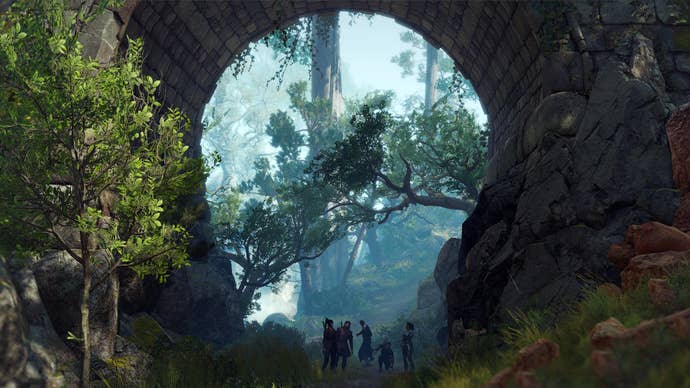
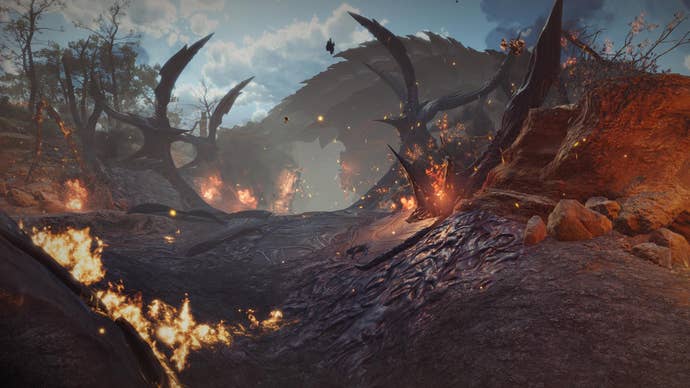
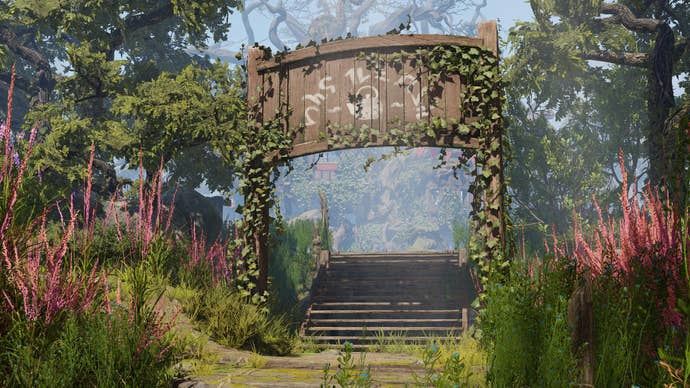
VG247: I enjoyed seeing the systems and dice rolls. I enjoyed seeing that on screen, because it helps me understand the rules and processes a little bit more.
"If you fail a roll then you’re probably going to have a more interesting experience."
Adam Smith: It does to me as well. I think it makes it a little less frustrating.
VG247: I think Divinity felt like there was an element of trial and error. I was learning from my errors, and I didn’t mind making errors, but it was frustrating when I don’t know what the error was. So then you’re trying to learn to play by rote, because you know basically what’s coming up in the next room, because it absolutely obliterated you last time. How do you take steps to ease that frustration?
Adam Smith: Part of it is making failure fun. So especially in dialogues, it’s like, sometimes if you fail a roll then you’re probably going to have a more interesting experience. Sometimes it’s fun when you fail. The flip side of that is, it’s not fun if you fail and you just get punished and have to quick-load. That sucks. So there’s a balance to be made between making things interesting that happen when you do badly, and giving you cool things to get out of, cool problems, basically. Or just entirely, again, from the dialogue side, completely new branches that you might not have got. There are points where if you f**k up a roll in dialogue, you might end up meeting somebody you never would have met before. Getting thrown in jail can be really good fun, because suddenly you get to meet other criminals. There are things like that. So if you go through the game perfectly, you’re probably not going to have a great time, but you’re never going to do that anyway.
There’s always going to be an element of frustration if you make a game that’s difficult, and in its current build, this game is very difficult. We haven’t started building difficulty modes in yet, because nothing’s final in terms of balance, but we will think about those things a lot. For me, I really enjoy tactical combat, so I’m very happy with this. Normally with RPGs, I tend to just be very story-based. There’s where I’m in my happy place. But I love turn-based combat. And there are points where we’re doing stuff with stealth, it feels almost like, what was it called? Shadow Tactics, or the old Commandos games, where you have all these different systems in play. And you can do very silly things, as well. I really, really enjoy that part of it.
The first time we got stealth working, when that actually went into the build I was working on, and we suddenly had light and darkness, we had the view cones and everything, and we got - one spoiler - but we got a kind of heist-y situation later on. Playing it in multiplayer and just being like, ‘this doesn’t feel like a D&D game any more. It feels like something else.’ Then it’s like, ‘no, of course though, in D&D you do this s**t.’ You do. People do that kind of stuff in D&D. It’s just not what I’ve played in a video game of D&D before. And that’s the stuff that really gets me excited on the systems side. It’s complicated, but also it’s view cones, and shadows, and light and darkness. So there’s a readability to it. And I think that readability, and getting the legibility into the systems, is really difficult because of how many there are. And some people want to see them, and that helps them to understand it. For some people, that just gets in the way. So there’s a balance there that we’ll find.
VG247: As senior writer, how do you keep the narrative on track when there are so many random elements that you can’t control? Like at a point this afternoon, it just descends into hysterics with death and destruction stemming from a simple conversation. Do you have to check your ego a little bit, because you’re like, ‘I’m trying to write a story here,’ and there are flaming goblins shooting across the screen. You can't improvise like a Dungeon Master can.
Adam Smith: No, no. I’ll tell you a good anecdote, which is word-for-word the truth. So when we were building that dungeon, the first one you saw, the small one, the chapel, there was a point when - I designed that, and you didn’t see most of the actual backstory, because the player wasn’t reading books and plaques and stuff. But it has a history, it has a place in the world, and there’s a lot you can learn about it. So when we were building that, we did it quite quickly. It was like, ‘we should have a dungeon early in the game, because otherwise we’ve got dragons in the intro but no dungeons. So it’s not a f**king Dungeons and Dragons game. We should probably put a dungeon in this game at some point.’
VG247: Definitely.
Adam Smith: So we were like, ‘let’s have a dungeon early on where we can play with some of this stuff.’ So I built the narrative for it really quickly. And it was like, ‘okay, this is what we’ll do.’ And it’s one of the first questions, it’s a chapel. Who’s it dedicated to? And I was like, ‘okay, it’s dedicated to Selune,’ which you probably saw on screen. And Selune’s a peaceful goddess. So we’re going through the design, I was like, ‘okay, let’s do this with this room, this room does this, this is this, this is that.’ And then one of our early gameplay designers came back to me. He said, ‘I put all the traps in that room,’ and I was like, ‘what traps?’ And walked in, and f**king flames start shooting across me, and everything was on fire. I was like, ‘it’s the goddess of peace and motherhood.’ And he was just like, ‘yes, but that’s gameplay.’ I was just like, ‘fair enough.’ So then I have to go back and explain why this is happening. That’s a very blunt example of it, but there is that thing where it’s just like, ‘sometimes you’ve just got to shut up, Adam, and let people have some gameplay.’
"If people are smiling and laughing and killing a character that I spent three weeks f**king writing, without even saying ‘hello,’ to it, I’m pretty happy, to be honest. Because that’s more important."
And the thing is, dialogue is gameplay. There’s a huge amount of gameplay within the dialogues. But really, the honest answer is, if people are smiling and laughing and killing a character that I spent three weeks f**king writing, without even saying ‘Hello,’ to it, I’m pretty happy, to be honest. Because that’s more important.
VG247: Yes. And there’s a chance they’ll see it a second time around.
Adam Smith: Well, yes, that’s the thing. It’s like, there’s no way everyone’s going to see everything the first time around. And like, the goblins I have a particular affection for, because I spent a lot of time working on those goblins. At one point, I was writing the goblins, and someone was like, ‘they always say, “write what you know,” Adam.’ And I was like, ‘charming, man.’ So I have real affection for them. I spent a lot of time thinking about goblins. I spent a lot of time researching goblins and how they fit into this. What is their culture? How do they feel about their place in the world? And one of the things that almost feels meta, is goblins are kind of at the bottom of the food chain. They’re what adventurers kill to get some experience. And I was like, ‘they must feel pretty shitty about that.’
VG247: They’re just above rats in the food chain, basically.
Adam Smith: Yes, exactly. So I was like, ‘well, let’s let people go in and have the goblins be a little bit cheeky and cocky, but they’re also pretty scared of you.’ If you’re level one, not so much. But if you’re a little bit tougher, they know you can wipe the floor with them. But they’re the kind of – not all of them, because they’re all individuals - but they have that mentality of being like, ‘everyone just steps on us all the time.’ So as soon they get the chance to step back, they’re going to take it. But it’s because they’re scared. But so many people are just going to murder them all, and that’s fine. Honest. And then you can speak with them when they’re dead as well, with the right spells.
VG247: In terms of companions - how many will there be?
Adam Smith: We showed five. There are more, though. There will be five for Early Access. Yes, and then we’ll throw out more.
VG247: Okay. And you can romance all the companions?
Adam Smith: Yes. They can all romance each other, yes.
VG247: And obviously that has an effect on the group dynamic and the conversations between characters?
Adam Smith: Yes. So I think I can safely give you an example. We haven’t talked about it yet. But it’s one of those things that if you actually do any research... So, Liselle, she’s the Githyanki. And Githyanki don’t really do monogamy. So if you sleep with Liselle one night at camp, the next night you might well just find her sleeping with somebody else. And she’s going to be like, ‘oh, that was a bit of fun, wasn’t it? How are you doing?’ And you’re just like, ‘oh!’ Heartbroken!
But you know, we don’t want to make it into this romance system which is, ‘I earned this person.’ We want it to feel more real. We want to have jealousy. We want to have just great joy in it, as well. But yes, we don’t want it to be a case of, ‘you brought me the gift that I like the most, so you got +50 affection.’ It’s much more based on how you deal with them, and the things you do. So when I say, ‘everyone’s romanceable by everybody else,’ that's not in every playthrough. And in multiplayer, you can literally end up on opposite sides as the other players, which is really cool. You can end up on two different sides of a big battle, because you just chose different sides at that point. And then you just separate and go your own ways.
VG247: So how does the multiplayer work in terms of players branching off and following multiple storylines?
Adam Smith: Very similar to Divinity: Original Sin 2, in the sense that it’s the same structure. So basically, it’s up to four people, and you can separate, you can go your own way. One of the things that we wanted to push further in D:OS 2 was people having different agendas. So the thing that I think we’re doing really well, which D:OS 2 didn’t do as well, is in D:OS 2 we had a thing where sometimes it’d be like, ‘this origin character has a really cool story.’ And I’m like, ‘he might have a really cool story, but he felt like a side story.’ So one of the things we’re doing here is saying that your stories are all intrinsically tied to the main story. The thing is, it kind of helps that our main story is, ‘you’ve all been infected with a parasite.’ So everyone’s on common ground. But beyond that, they have no common ground. So they all have their own ways of wanting to deal with it all, and not wanting to deal with it. And then as you go deeper and deeper, then the urgency and the threat of it increases, and the tension rises and rises and rises.
"We know turn-based, and Fifth Edition D&D is played in rounds, so it kind of made sense"
It’s really important for me that that doesn’t necessarily just become, ‘everyone’s hostile and everyone’s tense,’ because it can also be, ‘well, we’re in a really shitty situation, so let’s f**king lean on each other.’ You want to get that as well. But yes, the differences of opinion about what to do, in multiplayer particularly, because with companions, companions can leave you and they can do their own thing, but in multiplayer particularly, there are going to be points where it’s going to be like, ‘well, you know what? I’m going to follow this lead, you go follow your own lead.’ And then maybe when you’re following your lead, you find out, ‘oh, the place that Adam just went to is real f**king bad. And whatever he’s doing there, I don’t trust him any more,’ because you learn something else. So we want to get that stuff baked into it as well.
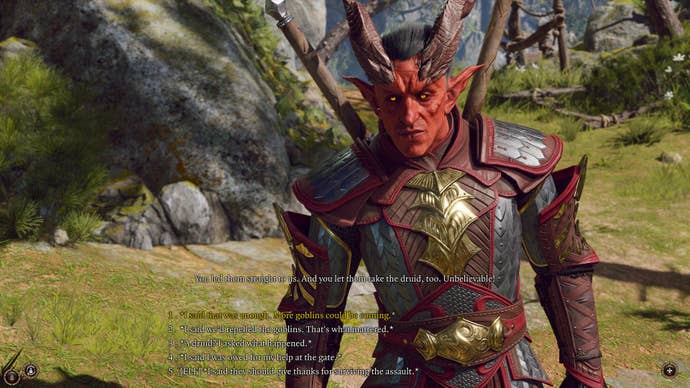
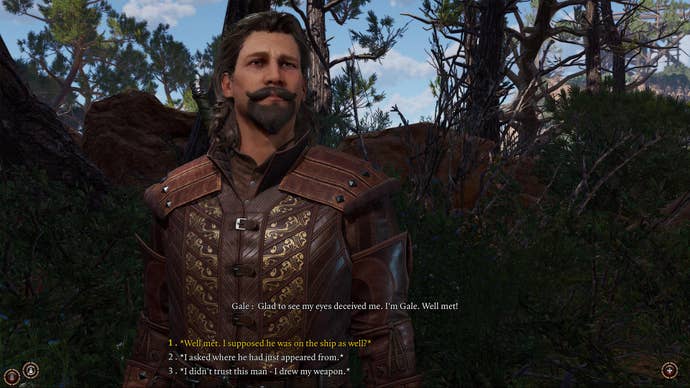
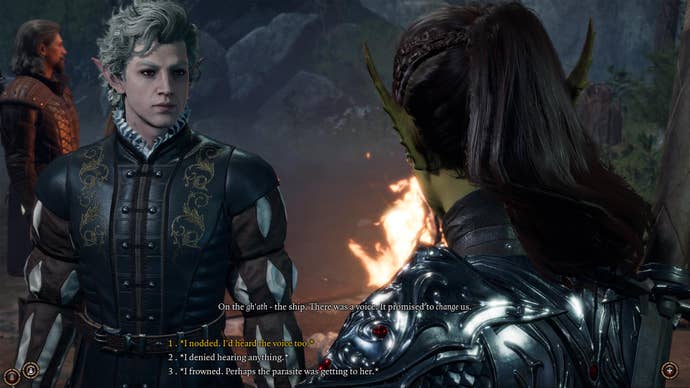
VG247: The last two Baldur’s Gates weren’t using turn-based combat. And obviously, this one is. And I think, I don’t have a problem with it, but do you think that might put off the original Baldur’s Gate fans?
Adam Smith: I think real Baldur’s Gate fans come in all shapes and sizes and have different opinions about it. So like, it’s not a group, it’s a really broad and diverse group of people. I’m an original Baldur’s Gate fan, and I never particularly loved real-time and pause, because - and again, this actually goes back to the thing you were asking about first - I’m really bad at micro-managing. So if I feel there’s like a stress element to it, then I tend to just not bother. So I’ll build a party that’s really simple, in Baldur’s Gate 1 and 2, because then I’m like, ‘well, I feel like I can manage this.’ Whereas if I’ve got to be monitoring people and constantly clicking on them, then I just get a bit frustrated. But in turn-based, I feel more in control. So for me, it feels good.
Part of the decision is that we know turn-based, and secondly, it’s that Fifth Edition is played in rounds, so it kind of made sense to say, ‘let’s do it that way.’ And the thing is, a round can be an increment of time, and you can do it real-time and pause, but it made sense - again, I’m not saying you can’t do these things in real-time and pause, but I think it's a lot harder. But it lets you do things like separating the party and having one person on high ground and one person on low ground. It means when the combat starts, there’s a better sense of, ‘I’m going to get a sense of the tactical situation. I’m going to send this person over here, I’m going to do that, I’m going to send this person behind and shove an enemy.' That level of control and being able to just zoom out and say, ‘okay, what am I doing here? What do I think I want to do?’ I can go into my inventory, I can just take stock. I don’t feel like I waste movement as much.
And also the stuff we can do with stealth as well. It’s a lot easier when you can do the force turn-based. I mean, you could play the entire game turn-based. It’d be really boring, but you could. But it does let us do super complex heist situations and stuff like that, which, you know, it’s just really good fun. It feels different.
And the thing is we are never going to please everybody. And you never will. It doesn’t matter what you’re working on. So we try not to second-guess ourselves, and we say, ‘we know that what we’re doing feels true to the spirit. We know that it’s going to be entertaining. So we’re going to do it.’ And that doesn’t mean we want to annoy anyone, it doesn’t mean we want to upset anyone. We really don’t. But if people – if they get turned off by that, then what we’d want to say to them is, ‘give it a shot.’
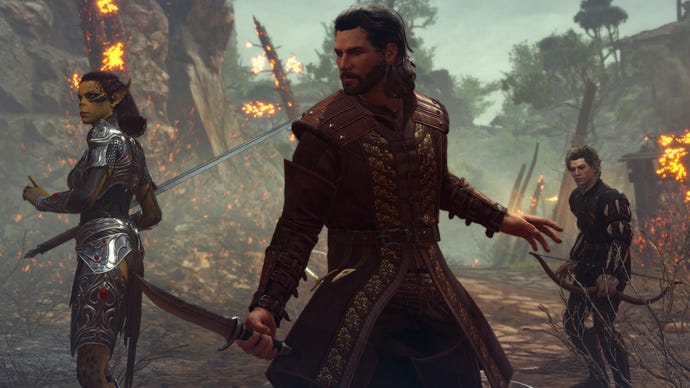








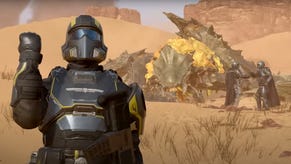
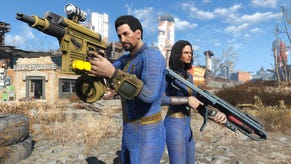
.jpg?width=291&height=164&fit=crop&quality=80&format=jpg&auto=webp)

